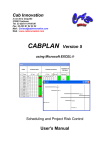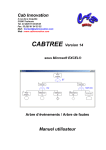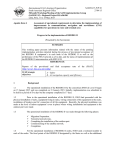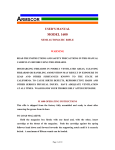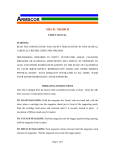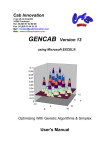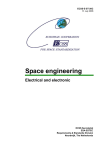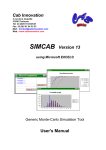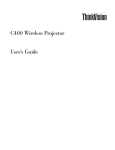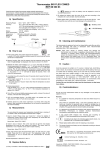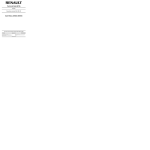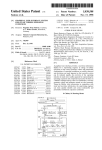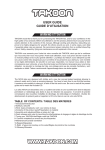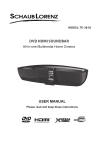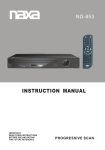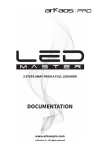Download FAILCAB V7 English
Transcript
Cab Innovation 3 rue de la Coquille 31500 Toulouse Tel. 33 (0)5 61 54 68 08 Fax. 33 (0)5 61 54 33 32 Mail : [email protected] Web : www.cabinnovation.com FAILCAB Version 7 using Microsoft EXCEL® Risks analysis and FMECA User's Manual FOREWORD The software FAILCAB BASIC version 2 includes some of the FAILCAB version 7 features. It is not the subject of a specific user manual The copyright law and international conventions protect the FAILCAB software and its User’s Manual. Their reproduction or distribution, either wholly or partly, through any means whatsoever, is strictly prohibited. Any person who does not comply with such provisions is committing an offence of forgery and is liable to prosecution and can be sentenced under the provisions prescribed by the law. The Programming Protection Agency (A.P.P.) references FAILCAB at the I.D.D.N. (Inter Deposit Digital Number) index, with the following reference: IDDN.FR.001.070017.00.R.P.2000.000.20600 CONTENTS: 1 The FAILCAB Software 1.1 General Presentation 1.2 Installing FAILCAB on Hard Disk 1.3 Starting FAILCAB 2 Teachware 2.1 Risks control 2.2 Preliminar Risks Analysis (PRA) 2.3 Failure Modes, Effects and Criticalities Analysis (FMECA) 3 PRA 3.1 3.2 3.3 3.4 3.5 3.6 3.7 3.8 3.9 4 Main Functionalities Creating the PRA Format Constructing the Arborescence Entry Grid Field Search Replacing Automatically Selection Synthesis Sheets FMECA 4.1 Main Functionalities 4.2 Creating Formats 4.3 Entering Product’s Material Arborescence 4.4 Creating FMECA Document 4.5 Entry Grid 4.6 Field Search 4.7 Replacing Automatically 4.8 Supplementing FMECA Automatically 4.9 Selection 4.10 Synthesis 4.11 Formatting Before Printing 3 1 The FAILCAB Software 1.1 General Presentation FAILCAB helps achieving and operating FMECA (Failure Mode Effect And Criticity Analysis) and PRA (Preliminary Risks Analyses) according to specific or standard formats (Standards X 60-510, CEI 812-1985 and MIL-STD-1629A). It automatically controls the material or functional product arborescence and offers various supports to user to relieve him from a major part of typing activity. So, this allows to supplement automatically the FMECA from nomenclatures, lists of fault modes, effect synthesis, or any other database. Furthermore, such supports foster the standardization of words used so as to facilitate the subsequent performance of analyses using multiple-criterion sorting. From FMECA or PRA, FAILCAB allows also to automatically generate synthesis documents such as the risks control manual intended for the product operators. 1.2 Installing FAILCAB on Hard Disk Please comply with instructions shown in CD-ROM. 1.3 To Start FAILCAB In EXCEL, open file FAILCAB.xla. Software's functionalities are then accessible using "PRA" or "FMECA" menus, spreadsheet functionalities remaining always available. The command "Others menus" allows to change the menu. 4 Bannrsr on Excel versions after 2007 Menus on Excel versions prior to 2007 A help and a teachware are proposed in the menu. 5 2 Teachware The teachware presents the risks control methods by means of various tables and demonstrations. 2.1 Risks control 6 7 2.1 Preliminar Risks Analysis (PRA) 8 9 2.1 Failure Modes, Effects and Criticalities Analysis (FMECA) 10 11 3 PRA The Preliminary Risks Analysis (PRA) purpose is to identify risks at the early steps of design so as to be capable of controlling them. Such identification results in a deductive approach which, on a complex system, is only really possible if the latter is preliminarily broken down in sections being sufficiently reduced to be correctly apprehended by a human spirit. Such breaking down may naturally regard system functions, but may also concern the time allowance (critical phases), or an industrial process (tasks). Functional Arborescence Identification of risks using functional breaking down… Apprehended events Criticity Actions for reducing risks Action status 1 3 4 2 Action A Action B ........... ........... Open Closed ........... ........... Product 1. Function A 2. Function B 2.1. 2.1.1. Elementary Function X Untimely operation Function loss Deteriorated operation 1 Deteriorated operation 1 ....................... 2.1.2. Temporal arborescence ... or temporal breaking down Critical phases 1. Phase A 1.1. Sub-phase a 1.1.1. Event x 1.1.2. Event y Dreaded events No event Untimely event ....................... y before x Criticity Observed Actions for reducing risks 1 3 Signal X ............ Action A ............ 2 ............ ............ In the case of a functional analysis, the risks identification results from an interrogation about possibilities of absence, untimely or deteriorated operation of any elementary function, together with nuisances it may cause to environment (pollution, overheating, impact...). Such interrogation leads to a list of apprehended events. Depending on nature of risks and functions studied, the breaking down may be conducted more or less deeply in arborescence, according to analyst priority. In the case of critical phases, the latter attempts to know whether the event sequence may be disturbed (absent, untimely or wrongly ordered events,). So identified apprehended events are subject to a classification according to a scale of gravity of consequences (or criticity), and actions for reducing risks may then be considered. By setting up a data base combining risks and functions (phases or process) of product, rules of design with justification of certain choices, the PRA enables also to formalize the return of experience. 12 3.1 Main functionalities FAILCAB helps user conduct PRA then operate it. It offers the following functionalities, accessible from menu PRA : . Creating PRA format . Performing the functional or temporal arborescence (automatic management of arborescence references) . Entering data fostering their standardization (typing grid, field search, automatic replacement) . Selection in PRA from multiple criteria . Generating synthesis documents from personalized formats (synthesis on symptoms observable by the example) . Generating individual files per apprehended event A simplified application example is shown below. More comprehensive examples are accessible using online help. 13 Functional Arborescence 1. Payload 2. Orbit and attitude checkout 3. Data Handling 4. Telemetry / Remote Controls 5. Heat Control 6. Power supply 6.1. Power generation 6.1.1. Maintaining solar panels prior to spreading out 6.1.2. Releasing Solar Generator (tie rods' cutting) 6.1.3. Solar generator spreading out 6.1.4. Locking 6.1.5. Energy Generation (solar cells) 6.2. Solar generator orientation 6.3. Power control 6.4. Energy storage (batteries) 6.5. Power distribution Dreaded Events Crit. Observable Symptoms Untimely firing of a pyrotechnical squib Actions for Reducing Risks Specific protection Tie rod failure Wrong behaviour on lauching Pyrotechnic shear failure 2 2 1 Margin + tests Pyrotechnic squib failure Stacking bush adhesion 2 2 Redundancy Hooking of bush by a distorted tie rod after cutting Hinge lock by bearing-way pollution Stacking part mounted in the wrong way 2 TM1 2 1 TM7 Insufficient motorization Failure/distortion of panels or hinges Incorrect locking generating dynamic disturbances Wrong behaviour to locking shock (hinge) 2 2 2 Failure of spreading out sensors Cell pollution (propulsion, pyrotechnic ...) 3 4 Destruction due to micrometeorites Insulation loss between network and a panel structure Wrong checking Bar undervoltage Bar overvoltage Heat dissipation (gradients) Battery explosion Battery electrolyte leakage Limiter loss 4 2 Qualification TM2; TM3; TM5 2 TM4; TM6 2 2 1 3 1 2 4 Extract from the Preliminary Risks Analysis of a satellite 14 Design modification Cleaning action Polarization + Procedures Margin + tests Protection 3.2 Creating the PRA Format The command "PRA format" of menu PRA helps creating a new format, store the latter in a directory specific to user or recover a pre-stored format. Requesting the creation of a new format generates the display of next menu in which a number of fields is offered to user in the French or English language. User may choose among the latter by defining relevant column numbers, and possibly define other fields in the last four items offered. Action on OK button generates the creation of requested format in a new sheet : So, modifying column width is possible by moving separation lines with mouse or performing manually other format modifications. The latter may be saved either immediately after creation, or from an informed PRA, so as to be reused. 15 3.3 Constructing the Arborescence Command "Arborescence" of menu PRA allows to create an arborescence, in the sheet of selected format or in a blank sheet, or recopy an arborescence already created in another format sheet. A position in arborescence is defined by a series of numbers separated by dots. Each number features a breaking down order at a certain arborescence level and its position in the series defines the depth in this one. 0 1. 1.1. 1.2. 1.2.1. ... The following utilities bar helps managing automatically such numbering. It is displayed or hidden using Command "Utilities bar". Modifies initial position by incrementation at the immediately higher level : 1.3. → 2. This command can be used directly on a selected part of the arborescence. Inserts a new position by incrementation at a higher level : 1.3. → 2. Inserts a new position by incrementation of initial position : 1.3. → 1.4. Inserts an additional sub-level in arborescence from the initial position : 1.3. → 1.3.1. Modifies initial position by incrementation at immediately lower level : 1.3. → 1.2.X. This command can be used directly on a selected part of the arborescence. A coherence check inhibits certain untimely actions to prevent disruptions in arborescence. Buttons and help insert or delete lines in document. 16 Recalculates automatically any arborescence numbering by indicating any possible incoherence. Helps displaying arborescence at a chosen breaking down level. This one is initiated in a new document, which can be possibly saved. Allows adjusting the space generated by the program between the numbers of different arborescence levels. 1. ↔1.1. Allows adjusting the height of cells in the sheet. 3.4 Typing Grid Command "Typing grid" of menu PRA enables to display a grid to be informed which reassumes the different PRA fields (see example below). Such grid helps display different PRA files (corresponding to different lines of the latter) that user may select using cursor or buttons "Previous" and "Next". Position in arborescence is reminded in grid upper section. Then, user may: . insert or cancel files at desired positions (buttons "Insert" and "Cancel"), . inform or modify a sheet then recopy it in PRA document (button "Recopy"), . restore sheet in its initial condition, as soon as this one remains selected (button "Restore"). 17 3.5 Field Search Command "Field Search" of menu PRA helps display preliminarily-entered information in all cells of selected column. Such information is sorted out in alphabetic or increasing order in dialog box, and a cursor helps facilitating the search thereof. Selected information, which is displayed in dialog box top section, may then be recopied in cell selected by simply acting on button "Copy". Such functionality prevents from reentering already saved information and helps standardize this one in order to facilitate subsequent selection thereof through multi-criteria sorting. 3.6 Replacing Automatically Command "Replacing Automatically" of menu PRA allows modifying terms used in PRA depending on different criteria, as shown in dialog box of next page. In this example, telemetry TM3 is replaced by TM12 in field "Observable Symptoms" only when a overheating is apprehended. Other informed telemetry applications in this field are not affected by such modification. 18 3.7 Selection Command "Selection" of menu PRA helps perform searching in analysis document from multiple criteria. Initiating such command displays a selection table in which user finds out again different fields of his document. So, he defines his criteria as follows : . Each table cell only includes one criterion relating to relevant-column field. . A condition AND is considered between criteria of a same line. 19 . A condition OR is considered between criteria of different lines. So, previous example leads to searching apprehended events relating to pyrotechnics with criticity lower than 2, and those relating to impacts for product function whose reference in arborescence begins with 6.1.4. Selection criteria may require comparison operators ( = , > ,< , >= [higher or equal], <= [lower or equal] ) and generic characters ( ? [a whatsoever character], * [many whatsoever characters] ). After defining his criteria, user commands selection by pressing button "Selection" located close to table. So, search results are displayed on sheet together with selection criteria. 3.8 Synthesis Command "Synthesis" of menu PRA helps performing automatically a PRA synthesis document, as that shown below, from a user predefined format. In addition to a synthesis depending on apprehended events, the generated document may e.g. concern criticity, so as to set a hierarchy in actions for reducing risks, or observability, for informing system instructions manual on possible causes of probable hazards. 20 Synthesis format corresponding to such example is shown below : Command "Synthesis Format" enables to create such format, save this one in a directory specific to user or recover a pre-saved format. Creating a new synthesis format is carried out from a blank format sheet that the user documents using the following utilities bar : Allows recopying in any sheet cell the name of one PRA field using a scrolling menu as that shown below. Allows entering, in any sheet cell, the reference of a PRA field using a scrolling menu similar to previous one. During synthesis, this reference (of type $ + field No.) will be automatically replaced by the information entered in this field for any page of document. 21 Allows to enter, in one vertical cell table located any place in sheet, the reference of a PRA field using a scrolling menu similar to previous one. During synthesis, this table (the reference of which is of type $$ + field No.) will be automatically replaced by the list of information entered in this field for any page of document. Allows to enter, in any sheet cell, the reference of the PRA field on which the synthesis will be carried out (activation field). A synthesis sheet will be generated as many times as different information will have been entered in cells of this field. Such reference (of type $$$ + field No.) will also be replaced by relevant information. Differs from previous button due to the fact it is used for fields capable of including a list of information separated by semicolons (e.g. : TM1; TM2; TM12). A synthesis sheet will then be generated for any different information. Reference used is of type $$$$ + field No. This utilities bar may be displayed or be hidden using command "utilities bar "Synthesis format" ". During synthesis, selection table according to various criteria is offered to user to possibly limit the synthesis to a PRA portion. 3.9 Sheets Command "Sheets" of menu PRA helps performing automatically a document for printing which reassumes the different PRA sheets according to same format as that proposed by the entry mask. Such document may cover the whole PRA or only certain sheets. 22 4 FMECA The Failure Mode Effect and Criticity Analysis (FMECA) consists in searching the effects at equipment level then at system level of elementary-component faults (see example below). Fault modes considered may be defined at component or functional unit level (a few components providing an elementary function) and are deriving from standards or databases specific to user or project concerned. 4.1 Main Functionalities FAILCAB helps user conduct FMECA and then operate it. It offers the following functionalities, accessible from menu FMECA (see next page) : . Creating formats (FMECA, parts list, fault mode lists) . Entering material product arborescence . Creating FMECA document (database) . Entering data fostering their standardization (entry grid, field searching, replacing automatically) . Supplementing automatically the FMECA from : - Parts lists (list of components, functional units, fault rates ...) - Fault mode databases (at component or functional unit level) - Syntheses of effects (from equipment to system) - Any other databases imported on Excel 23 . Selecting in FMECA from multiple criteria . Generating synthesis documents from personalized formats (synthesis on symptoms observable using the example) . Formatting prior to printing Menu "FMECA" 24 4.2 Creating Formats Similar to that of menu PRA, command "Formats" of menu FMECA helps creating formats for various documents (FMECA, Parts Lists, Lists of fault modes...) in the French or English language. It also allows obtaining standard formats defined in standards X 60-510, CEI 812-1985 and MIL-STD-1629A. It is also used to save such formats in a directory specific to user or recover pre-saved formats. 4.3 Entering Product's Material Arborescence Command "Arborescence" of menu FMECA allows entering the material breakdown as in example below. Initiating such command generates the creation of a new document where user may enter the arborescence using dialog boxes and same utilities bar as that used for the PRA (see PRA section of manual). Such utilities bar is displayed or hidden using command " Arborescence utilities bar". 25 4.4 Creating FMECA Document Command "Creation" of menu FMECA helps creating FMECA from a document format and material product arborescence. Its activation generates the display of the following dialog box in which user specifies the concerned documents among all opened documents (format and arborescence). Acting on button OK results in creating a document as that shown below. Functional block # 1. POWER SUPPLY Number Component Failure mode Failure rate Effects at equipment level # 2. CALCULATOR # 2.1. Converter # 2.1. CPU card # 2.2. Memory card # 2.3. Interface card # 2.3.1. Logic interface module # 2.3.2. Analogic interface module # 3. ACTUATOR # 4. DETECTOR 26 Effects at system level Observable symptoms Criticity Remarks 4.5 Entry Grid Same as that of menu PRA, command "Entry grid" of menu FMECA allows to display a grid to be informed which reassumes the different FMECA fields (see example below). Such grid helps displaying different PRA sheets (corresponding to different lines of the latter) the user may select using a cursor or buttons "Previous" and "Next". Position in arborescence is reminded on top of grid. So, the user may: . insert or delete sheets at desired locations, . inform or modify one sheet then recopy in document PRA, . restore sheet to its initial condition, as long as this sheet remains selected. 4.6 Field Search Command "Field search" of menu FMECA helps displaying preliminarily entered information in cells of column selected. It looks like to that of menu PRA, but displayed information is limited to the arborescence portion in which selected cell can be found. 27 However, user may extend search by going progressively up in arborescence. 4.7 Replacing Automatically Same as that of menu PRA, command "Automatic replacement" of menu FMECA allows to modify terms depending on different criteria, as shown in following dialog box. 28 4.8 Supplementing FMECA Automatically Command "Supplementing" of menu FMECA allows to supplement automatically FMECA from various databases. Such supplementing may be performed from . Parts lists (list of components, functional units, fault rates ...), . Fault mode lists (at component or functional unit level), . Syntheses of effects (from equipment to system), . Any other databases imported on Excel. Same as for command "Creation", initiating command "Supplementing" generates the display of a dialog box in which user specifies concerned documents among all opened documents. Acting on button OK generates the display of a second dialog box in which user finds fields of both selected documents. So it indicates correspondence between source document fields and those of FMECA together with one or more activation fields, before running supplementing procedure. 29 Recopying source field information to the fields to be supplemented is then carried out each time correspondence between activation fields of both documents may be established. So, in this example, supplementing is performed as follows : Reference in hardware arborescence Unit Functional block Locate on diagram 2.3.1 Logic interface module Block a R1 R2 D1 Resistor RNR Resistor RNC Diode signal Block b C2 D2 Q1 U1 Capacitor CKR ZENER Diode Switching transistor Quartz Block c R1 R2 C1 C2 Q1 Resistor RNR Resistor RNR Capacitor CKR Capacitor CLR Linear transistor Block d R5 R6 Q1 Resistor RJR Thermistor RTH Switching transistor 2.3.2 Analogic interface module Component Failure rate Remarks Source document (parts list) Functional block 2.3. Interface card Number # Component Failure mode # 2.3.1. Logic interface module Block a Resistor RNR Resistor RNC Diode signal Block b Capacitor CKR ZENER Diode Switching transistor Quartz # 2.3.2. Analogic interface module Block c Resistor RNR Resistor RNR Capacitor CKR Capacitor CLR Linear transistor Block d Resistor RJR Thermistor RTH Switching transistor Failure rate Effects at equipment level Effects at system level Observable symptoms Criticity Remarks FMECA after supplementing The activation field corresponds here to reference in material arborescence (1). Information located in Functional Unit (3) and Component fields (5) were recopied in FMECA at different positions of arborescence stated in source document. Example below shows how this operation is performed with various activation fields. It regards a supplementing application from a list of fault modes. 30 Reference in hardware arborescence Component Technology Type Failure rate (fits) Failure mode % of failure rate 2.3.1 Resistor RNR Metal layer *RNR* 0,015 Short circuit 0% 0,09 Open circuit Drift Short circuit 20% 80% 35% 0,06 Open circuit Drift Short circuit 20% 45% 60% Open circuit Drift Blocked in ON position 40% 0% 2.3.1 2.3.1 2.3.1 Capacitor CKR Switching transistor Switch SPDT ceramics *CKR* *switching* *transistor* *Switch* *SPDT* Blocked in OFF position Intermediate position 2.3.1 Switch DPDT *Switch* *DPDT* Blocked in ON position Blocked in OFF position Intermediate position 2.3.1 Quartz *Quartz* 20 Short circuit Open circuit Drift Source document (list of fault modes) Information located in Failure Mode (6) and Fault Rate (5) fields will be recopied in FMECA as soon as one type of component (4) is recognized in FMECA Component field and correspondence with Reference in arborescence (1) is established. Generic character *, which replaces any number of characters, is used to recognize the type of component in a chain of characters. A field of source document defining positions in arborescence should be called with the word "arborescence" in its name. So, supplementing application regards here only section 2.3.1. of arborescence. 31 Number # # Functional Component Failure mode block 2.3.1. Logic interface module Block a Resistor RNR Short circuit Open circuit Drift Resistor RNC Short circuit Open circuit Drift Diode signal Block b Capacitor CKR Short circuit Open circuit Drift ZENER Diode Short circuit Open circuit Drift Switching Short circuit transistor Open circuit Drift Quartz Short circuit Open circuit Drift Failure rate Effects at equipment level Effects at system level Observable symptoms Criticity Remarks 2.3.2. Analogic interface module Block c Resistor RNR Resistor RNR Capacitor CKR Capacitor CLR Linear transistor Block d Resistor RJR Thermistor RTH Switching transistor FMECA after supplementing 4.9 Selection Command "Selection" of menu FMECA is used as that of menu PRA though selection table contains an additional line making it possible for user to specify whether fields should be informed by the program during selection (enter sign +). 32 So, in previous example, all fault modes leading to an overheating will be informed with, for each of them, the name of component and that of relevant functional unit. Selection criteria are initiated on results sheet right section. 4.10 Synthesis Same as that of menu PRA, command "Synthesis" of menu FMECA helps performing automatically a synthesis document, as that shown below, from a user predefined format. Synthesis of observable symptoms Synthesis of observable symptoms Telemetry : TM1 Synthesis :of observable Telemetry TM1 symptoms Effects at system level Criticity Risk of wrong controls Effects at system level 2 Telemetry : Effects at equipment level TM3 Decoding loss Criticity Effects at equipment level Component Signal diode Component 2 Decoding loss Synthesis of observable symptoms Risk of wrong controls Effects at system level Criticity Reconfiguration on redundant equipment Risk of wrong controls Telemetry : 3 2 Effects at system level Signal diode Effects at equipment level Component TM4 Equipment loss Resistor RER Resistor RER Untimely control Criticity Risk of wrong controls Deterioration of bit error rate. Risk of wrong controls Effects at equipment level Component 2 Bit inversion Resistor RWR 2 Risk of reading error Resistor RNC Synthesis format used in this example is as follows : Synthesis of observable symptoms $$7 $$7 $$7 $$7 Telemetry : $$$$8 Effects at system level Criticity $$9 $$9 $$9 $$9 Effects at equipment level $$6 $$6 $$6 $$6 Component $$3 $$3 $$3 $$3 It was created from command "Synthesis Format" which allows to generate a blank format sheet the user informs using utilities bar "Synthesis Format ", already shown in PRA section. During synthesis , the selection table is offered to user for possibly limiting the synthesis to an FMECA section. The user should specify whether fields should be informed by program during selection (enter sign +). 33 4.11 Formatting before Printing Command "Document to be printed" of menu FMECA generates a document similar to analysis document (active sheet) in which names of different fields are reminded on top of each page. A page jumping is systematically inserted between each arborescence element. User, using command «Formatting» of spreadsheet, before initiating document printing, may add a specific heading. 34 OPERATING LICENCE AGREEMENT OF FAILCAB SOFTWARE PACKAGE ARTICLE 1 : SUBJECT The purpose of this Agreement is to define the conditions in which the CAB INNOVATION Company grants the customer with a non-transferable, non-exclusive and personal right to use the software package referred to as "FAILCAB" and whose features are specified in user's manual. ARTICLE 2 : SCOPE OF THE OPERATING RIGHT The customer may use the software package on one single computer and on a second one provided that the second computer does not operate at the same time as the first one. The customer can only have one software package copy maintained in a safe place as a backup copy. If this license is regarding a performance on site, the customer may install the package software on a server, while scrupulously complying with purchase conditions stated on specific conditions especially defining the maximum number of users authorized to use the software package from their terminal and the maximum number of users authorized to use it simultaneously. The customer is therefore authorized to perform a number of software package documentation copies equal to the maximum number of users allowed to use it.. CAB INNOVATION will be in a position to perform inspections, either itself or through a specialized entity purposefully authorized by CAB INNOVATION, at customer premises to verify if customer has met its requirements : number of software package copies used, location of such copies, etc... Parties will agree as regards the practical modalities of performance of such inspections so as to disturb minimally customer's activity. ARTICLE 3 : DELIVERY, INSTALLATION AND RECEPTION The software package and attached supplies will be delivered to the customer on mail reception date. The customer installs, at its own costs, the software package using relevant manual delivered by CAB INNOVATION. The customer performs the inventory and shall inform CAB INNOVATION, within three working days of the delivery, of any apparent nonconformity with respect to the order. The customer is liable for any loss or any damage caused to supplies as from the delivery. ARTICLE 4 : TESTING AND GUARANTEE Guarantee is effective as from the mail delivery date set forth in Article 3 and has a three-month validity. During the guarantee validity, if the customer experiences a software package operation trouble, he should inform CAB INNOVATION about it, so as to receive any helpful explanations with the purpose of remedying such trouble. If the trouble is continuing, the customer will return the C.D. ROM to CAB INNOVATION, at CAB INNOVATION's Head Office, at his own expense and with registered mail with acknowledgement of receipt, by specifying exactly the troubles encountered. Within the three months of reception of consignment set forth in preceding paragraph, CAB INNOVATION will deliver, at its own expense, a new product version to the customer. This new version will be benefiting of the same guarantee as benefited the first version. The customer looses the benefit of the guarantee if he does not comply with the instructions manual recommendations, if he performs modifications of configuration set forth in Article 2 above without obtaining a prior written consent from CAB INNOVATION, or if he performs modifications, additions, corrections, etc... on software package, even with the support from a specialized service company, without obtaining a prior written consent from CAB INNOVATION. ARTICLE 5 : PROPERTY RIGHT CAB INNOVATION declares to be holding all the rights provided for by the intellectual property code for FAILCAB package software and its documentation. As this operating-right granting generates no property-right transfer, the customer abstains from : - any FAILCAB software package reproduction, whether it is wholly or partly carried out, whatever the form assumed, excepting the number of copies authorized in Article 2 ; - any FAILCAB software package transcription in any other language than that provided for in this Agreement (see Appendix), any adaptation to use it in other equipment or with other basic software packages de base than those provided for in this Agreement. To ensure this property protection, the customer undertakes especially to 35 - maintain clearly visible any property and copyright specifications that CAB INNOVATION would have affixed on programs, supporting material and documentation ; - assume with respect to his staff and any external person any helpful information and prevention step. ARTICLE 6 : USING SOURCES Any FAILCAB software package modification, transcription and, as a general rule, any operation requiring the use of sources and their documentation are exclusively reserved for CAB INNOVATION. The customer holds the right to get the information required for the software package interoperability with other softwares he is using, under the conditions provided for in the intellectual property code. In each case, an amendment of these provisions will set out the price, time limits and general terms of performance thereof. ARTICLE 7 : LIABILITY The customer is liable for : - choosing FAILCAB software package, its adequacy with his requirements, precautions to be assumed and back-up files to be made for his operation, his staff qualification, as he received from CAB INNOVATION recommendations and information required upon its operating conditions and limits of its performances set forth in user's manual; - the use made for results he obtains. CAB INNOVATION is liable for the software package conformity with his documentation. The customer shall prove any possible non-conformity. CAB INNOVATION does not assume any whatsoever guarantee, whether explicit or implicit, relating to the software package, manuals, attached documentation or any supporting item or material provided and, especially, any guarantee for marketing of any products relating to software package or for using software package for a determined use, any guarantee for absence of forgery, etc... Under no circumstances CAB INNOVATION could be held responsible for any whatsoever damage, especially loss in performance, data loss or any other financial loss resulting from the use or impossibility to use the FAILCAB software package, even if CAB INNOVATION was told about the possibility of such damage. In the event where CAB INNOVATION liability is retained, it is expressly agreed upon that the total amount of compensation to be paid by CAB INNOVATION, all cases taken together, could not in any way exceed the initial-royalty price reduced by 25 % per period of twelve months elapsed as from the mailing delivery date. ARTICLE 8 : DURATION This Agreement is entered into for an undetermined period of time as of the date set forth in Article 3. ARTICLE 9 : TERMINATION Each party may terminate this Agreement, by registered mail with acknowledgement of receipt forwarded to the other party, for any breach by such party of its obligations, despite a notice remaining unresponsive for 15 days, and this occurring with no prejudice to damages it could claim and provided that the last paragraph of Article 7 above, be enforced. At end of this Agreement or in case of termination for whatsoever reason, the customer will have to stop using FAILCAB software package, pay all sums remaining due on date of termination and return all elements composing the software package (computer programs, documentation, etc ... ) without maintaining any copy of it. ARTICLE 10 : ROYALTY As a payment for the operating-right concession, the customer pays CAB INNOVATION an initial royalty the amount of which is determined in specific conditions. ARTICLE 11 : PROHIBITED TRANFER The customer refrains from transferring the software package operating right granted personally to him by these provisions. The customer also abstains from making documentation and supporting material (CD ROM), even free of charge, available to a person not expressly set forth in second paragraph of Article 2. ARTICLE 12 : ADDITIONAL SERVICES Any additional services will be subject to an amendment of these provisions, possibly through an exchange of letters, so as to specify the contents, modalities of achievement and the price. ARTICLE 13 : CORRECTIVE AND PREVENTIVE MAINTENANCE 36 The corrective and preventive maintenance may be subject, upon customer's request, to a separate Agreement attached to these provisions. ARTICLE 14 : ENTIRETY OF THE AGREEMENT The user's manual defining the FAILCAB software package features is appended to these provisions. The provisions of this Agreement and his Appendix express the entirety of the Agreement entered into between the parties. They are prevailing among any proposition, exchange of letters preceding its signing up, together with any other provision stated in documents exchanged between the parties and relating to the Agreement's subject matter. If any whatsoever clause of this Agreement is null and void with respect to a rule of Law or a Law in force, it will considered as not being written though not involving the Agreement's nullity. ARTICLE 15 : ADVERTISING CAB INNOVATION could mention the customer in its business references as a FAILCAB software package user. ARTICLE 16 : CONFIDENTIALITY Each party undertakes not to disclose any kind of documents or information about the other party that it would have been informed of on the Agreement's performance and undertakes to have such obligation fulfilled by the persons it is liable for ARTICLE 17 : AGREEMENT'S LANGUAGE This Agreement is entered into and drawn up in the French language. In the event where it is translated into one or more foreign languages, only the French text will be deemed authentic in case of any dispute between the parties. ARTICLE 18 : APPLICABLE LAW - DISPUTES The French Law governs this Agreement. In the event of any disagreement over the interpretation and performance of any whatsoever provision of this Agreement, and if parties fail to reach an agreement under an arbitration procedure, only Toulouse’s Courts will be competent to settle the dispute, despite the plurality of defendants or the appeal for guarantee. 37






































